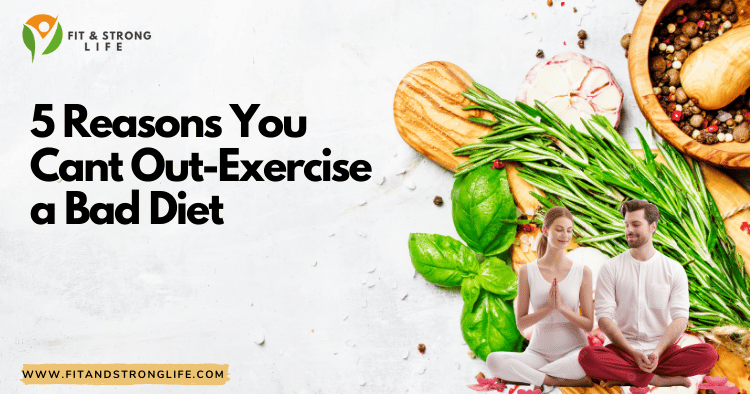Table of Contents
- Understanding the Basics of Nutrition
- The Caloric Deficit Dilemma
- Quality vs. Quantity: Not All Calories Are Created Equal
- The Role of Recovery and Rest
- Long-Term Sustainability: The Key to Success
Understanding the Basics of Nutrition
In the world of health and fitness, the phrase “you can out-exercise a bad diet” often circulates, but is it true? Before diving into why this myth is problematic, it’s essential to understand the fundamentals of nutrition.
Nutrition is the cornerstone of health. The food we consume fuels our bodies, influences our energy levels, and plays a significant role in how we feel overall. A balanced diet rich in fruits, vegetables, whole grains, lean proteins, and healthy fats is crucial for optimal performance, recovery, and well-being. For more insights, explore our Essential Guide to Macronutrients for Optimal Fitness.
“Nutrition is not just about eating, it’s about learning to live.” – Anonymous
FAQ:
Q: Can I just exercise more to compensate for my poor eating habits?
A: While exercise is beneficial, it cannot fully negate the adverse effects of an unhealthy diet.
The Caloric Deficit Dilemma
Many people believe that as long as they maintain a caloric deficit—burning more calories than they consume—they can lose weight, regardless of their food choices. However, this approach overlooks several critical factors.
- Metabolic Rate: Your metabolic rate can be affected by the type of food you consume. Protein-rich foods, for example, require more energy for digestion (known as the thermic effect of food). This means that consuming a diet high in processed foods can lower your metabolic efficiency.
- Nutritional Value: A diet consisting of empty calories (like sugary snacks) may lead to quick energy spikes followed by crashes, which can lead to increased cravings and overeating.
- Exercise Burn Estimates: The number of calories burned during exercise is often overestimated. For instance, a 30-minute session of moderate cycling may only burn around 250-300 calories, which can easily be negated by a single sugary drink.
| Activity | Calories Burned (30 minutes) | Food Item | Calories |
|---|---|---|---|
| Moderate cycling | 250-300 | 1 medium chocolate bar | 200-250 |
| Jogging | 300-400 | 1 slice of pizza | 285 |
| Swimming | 300-400 | 1 fast-food cheeseburger | 300-500 |
“Calories count, but not all calories are created equal.”
Quality vs. Quantity: Not All Calories Are Created Equal
Not all calories are created equal. While it’s true that maintaining a caloric deficit can lead to weight loss, the source of those calories plays a critical role in overall health.
- Nutrient Density: Whole foods are generally more nutrient-dense than processed foods. For instance, a serving of broccoli is packed with vitamins, minerals, and fiber compared to a serving of chips, which offers little more than empty calories. For more on nutrient-dense foods, check out our article on the Top 10 Essential Vitamins and Minerals for Fitness Gains.
- Satiety: Foods rich in fiber and protein tend to keep you feeling full longer than foods high in sugar and refined carbs. This can lead to healthier eating patterns and reduced cravings.
- Impact on Health: A diet high in sugars and unhealthy fats can lead to inflammation, insulin resistance, and other chronic health issues, making it harder to sustain an active lifestyle.
FAQ:
Q: What are some examples of nutrient-dense foods?
A: Nutrient-dense foods include fruits, vegetables, whole grains, nuts, seeds, and lean proteins.
The Role of Recovery and Rest
Exercise isn’t just about the calories burned during your workout. Recovery is equally important and is often neglected.
- Muscle Repair: After a workout, your muscles need time to repair and recover, which is where proper nutrition comes into play. Consuming protein and healthy fats post-workout can aid in muscle recovery. For tips on post-workout nutrition, see our Top 7 Post-Workout Nutrition Tips for Optimal Recovery.
- Hormonal Balance: Poor nutrition can disrupt hormones that regulate hunger and metabolism, like leptin and ghrelin. This imbalance can lead to increased hunger and cravings, making it difficult to stick to healthy eating habits.
- Mental Health: Good nutrition supports brain health and emotional well-being. A balanced diet can improve mood and help maintain motivation to exercise.
“Recovery is just as important as the workout itself.”
FAQ:
Q: How important is post-workout nutrition?
A: Post-workout nutrition is vital for recovery, muscle repair, and maintaining energy levels for your next workout.
Long-Term Sustainability: The Key to Success
Sustainability is often the secret ingredient to long-term health and fitness success. Extreme dieting or solely relying on exercise can lead to burnout and frustration.
- Balanced Approach: A holistic approach that combines a healthy diet with regular exercise is more sustainable and effective. It’s about making lifestyle changes that you can maintain over time. For practical tips on meal prep, visit our 10 Essential Meal Prep Tips for Fitness Success.
- Building Habits: Focusing on building healthy eating habits—like meal prepping, mindful eating, and making nutritious choices—can lead to lasting change.
- Enjoyment: Eating should be enjoyable! Incorporating a variety of foods and occasional treats can help you maintain a healthy relationship with food while still reaching your goals.
FAQ:
Q: How can I make healthy eating more enjoyable?
A: Experiment with new recipes, try different cuisines, and involve friends or family in cooking to make the process enjoyable.
“Health is not just about what you eat. It’s also about what you think and feel.”
Conclusion
The idea that you can out-exercise a bad diet is a myth that can hinder your health and fitness progress. Understanding the importance of nutrition, recognizing the limitations of exercise alone, and focusing on sustainable, healthy habits will lead you to success. Remember, it’s about finding a balance that works for you and supports your overall well-being.
For more insights into nutrition and fitness, check out Harvard Health for credible resources and information. Also, consider reading our article on Top 10 Nutrition Myths Debunked for Optimal Fitness to gain a clearer understanding of common misconceptions in the fitness world.
“Success is the sum of small efforts, repeated day in and day out.” – Robert Collier
This article aims to clarify that while exercise is crucial for health, it cannot replace the need for a balanced diet. By recognizing the intricate relationship between diet and exercise, you can set yourself up for success and achieve your health goals!




